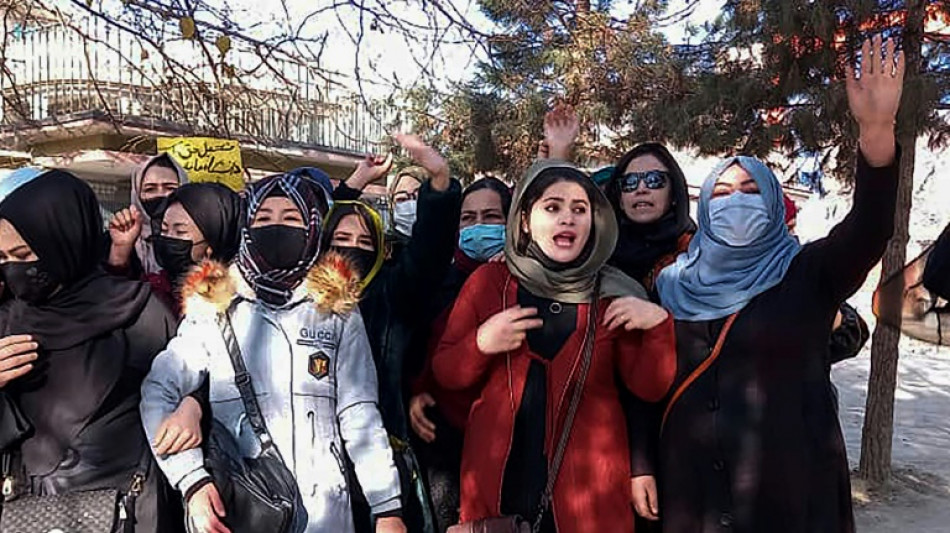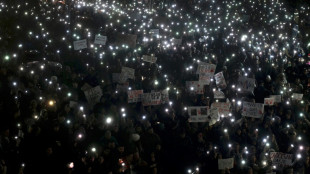
-
 Sweeping Vietnam internet law comes into force
Sweeping Vietnam internet law comes into force
-
Thousands attend Christmas charity dinner in Buenos Aires

-
 Demand for Japanese content booms post 'Shogun'
Demand for Japanese content booms post 'Shogun'
-
Mystery drones won't interfere with Santa's work: US tracker

-
 Global stocks mostly higher in thin pre-Christmas trade
Global stocks mostly higher in thin pre-Christmas trade
-
NASA probe makes closest ever pass by the Sun

-
 Global stocks mostly rise in thin pre-Christmas trade
Global stocks mostly rise in thin pre-Christmas trade
-
Global stocks mostly rise after US tech rally

-
 Investors swoop in to save German flying taxi startup
Investors swoop in to save German flying taxi startup
-
Saving the mysterious African manatee at Cameroon hotspot

-
 The tsunami detection buoys safeguarding lives in Thailand
The tsunami detection buoys safeguarding lives in Thailand
-
Asian stocks mostly up after US tech rally

-
 US panel could not reach consensus on US-Japan steel deal: Nippon
US panel could not reach consensus on US-Japan steel deal: Nippon
-
The real-life violence that inspired South Korea's 'Squid Game'

-
 El Salvador Congress votes to end ban on metal mining
El Salvador Congress votes to end ban on metal mining
-
Five things to know about Panama Canal, in Trump's sights

-
 Mixed day for global stocks as market hopes for 'Santa Claus rally'
Mixed day for global stocks as market hopes for 'Santa Claus rally'
-
Trump's TikTok love raises stakes in battle over app's fate

-
 European, US markets wobble awaiting Santa rally
European, US markets wobble awaiting Santa rally
-
NASA solar probe to make its closest ever pass of Sun

-
 Volkswagen boss hails cost-cutting deal but shares fall
Volkswagen boss hails cost-cutting deal but shares fall
-
Sweden says China blocked prosecutors' probe of ship linked to cut cables

-
 UK economy stagnant in third quarter in fresh setback
UK economy stagnant in third quarter in fresh setback
-
Global stock markets edge higher as US inflation eases rate fears

-
 US probes China chip industry on 'anticompetitive' concerns
US probes China chip industry on 'anticompetitive' concerns
-
Mobile cinema brings Tunisians big screen experience

-
 Honda and Nissan to launch merger talks
Honda and Nissan to launch merger talks
-
Asian markets track Wall St rally as US inflation eases rate fears

-
 Honda and Nissan expected to begin merger talks
Honda and Nissan expected to begin merger talks
-
Asian markets track Wall St rally as US inflation eases rate worries

-
 Trump vows to 'stop transgender lunacy' as a top priority
Trump vows to 'stop transgender lunacy' as a top priority
-
Beyond Work Unveils Next-Generation Memory-Augmented AI Agent (MATRIX) for Enterprise Document Intelligence

-
 Sweet smell of success for niche perfumes
Sweet smell of success for niche perfumes
-
'Finally, we made it!': Ho Chi Minh City celebrates first metro

-
 Tunisia women herb harvesters struggle with drought and heat
Tunisia women herb harvesters struggle with drought and heat
-
Trump threatens to take back control of Panama Canal

-
 Secretive game developer codes hit 'Balatro' in Canadian prairie province
Secretive game developer codes hit 'Balatro' in Canadian prairie province
-
Stellantis backtracks on plan to lay off 1,100 at US Jeep plant

-
 Banned Russian skater Valieva stars at Moscow ice gala
Banned Russian skater Valieva stars at Moscow ice gala
-
Biden signs funding bill to avert government shutdown

-
 Sorrow and fury in German town after Christmas market attack
Sorrow and fury in German town after Christmas market attack
-
France's most powerful nuclear reactor finally comes on stream

-
 Sierra Leone student tackles toxic air pollution
Sierra Leone student tackles toxic air pollution
-
Amazon says US strike caused 'no disruptions'

-
 Qualcomm scores key win in licensing dispute with Arm
Qualcomm scores key win in licensing dispute with Arm
-
Scientists observe 'negative time' in quantum experiments

-
 US approves first drug treatment for sleep apnea
US approves first drug treatment for sleep apnea
-
Amazon expects no disruptions as US strike goes into 2nd day

-
 US confirms billions in chips funds to Samsung, Texas Instruments
US confirms billions in chips funds to Samsung, Texas Instruments
-
Wall Street rebounds despite US inflation ticking higher


Afghan women banned from university 'for not following dress code'
Afghan universities were declared off limits to women because female students were not following instructions including a proper dress code, the Taliban's minister for higher education said Thursday.
The ban announced earlier this week is the latest restriction on women's rights in Afghanistan ordered by the Taliban since their return to power in August last year.
It has drawn global outrage, including from Muslim nations who deemed it against Islam, and from the G7 club of wealthy nations who said the prohibition may amount to "a crime against humanity".
But Neda Mohammad Nadeem, the minister for higher education in the Taliban government, insisted Thursday that women students had ignored Islamic instructions -- including on what to wear or being accompanied by a male relative when travelling.
"Unfortunately after the passing of 14 months, the instructions of the Ministry of Higher Education of the Islamic Emirate regarding the education of women were not implemented," Neda Mohammad Nadeem said in an interview on state television.
"They were dressing like they were going to a wedding. Those girls who were coming to universities from home were also not following instructions on hijab."
Nadeem also said some science subjects were not for suitable for women. "Engineering, agriculture and some other courses do not match the dignity and honour of female students and also Afghan culture," he said.
The ban came less than three months after thousands of women students were allowed to sit university entrance exams, many aspiring for teaching and medicine as future careers.
Secondary schools for girls have been closed across most of the country for over a year -- also temporarily, according to the Taliban, although they have offered a litany of excuses for why they haven't re-opened.
Women have slowly been squeezed out of public life since the Taliban's return, pushed out of many government jobs or paid a fraction of their former salary to stay at home.
They are also barred from travelling without a male relative and must cover up in public, and are prohibited from going to parks, fairs, gyms and public baths.
The Taliban's treatment of women and girls in Afghanistan including its latest move to restrict university access drew fierce reaction from the G7, whose ministers demanded the ban be reversed.
"Gender persecution may amount to a crime against humanity under the Rome Statute, to which Afghanistan is a state party," the ministers said in a statement, referring to the International Criminal Court in The Hague.
"Taliban policies designed to erase women from public life will have consequences for how our countries engage with the Taliban."
Earlier Thursday a group of Afghan women staged a street protest in the capital against the ban.
"They expelled women from universities. Oh, the respected people, support, support. Rights for everyone or no one!" chanted the protesters as they rallied in a Kabul neighbourhood, footage obtained by AFP showed.
A protester at the rally told AFP "some of the girls" had been arrested by women police officers. Two were later released and two remained in custody, she added, speaking on condition of anonymity.
- Rare protests -
Women-led protests have become increasingly rare in Afghanistan since the Taliban took over the country in August 2021, particularly after the detention of core activists at the start of this year.
Participants risk arrest, violence and stigma from their families for taking part.
Despite promising a softer rule when they seized power, the Taliban have ratcheted up restrictions on all aspects of women's lives.
After their takeover, universities were forced to implement new rules including gender-segregated classrooms and entrances, while women were only permitted to be taught by professors of the same sex, or old men.
The Taliban adhere to an austere version of Islam, with the movement's supreme leader Hibatullah Akhundzada and his inner circle of clerics against modern education, especially for girls and women, some Taliban officials say.
The international community has made the right to education for all women a sticking point in negotiations over aid and recognition of the Taliban regime.
In the 20 years between the Taliban's two reigns, girls were allowed to go to school and women were able to seek employment in all sectors, though the country remained socially conservative.
The authorities have also returned to public floggings of men and women in recent weeks, as they implement an extreme interpretation of Islamic sharia law.
U.Ndiaye--CPN




